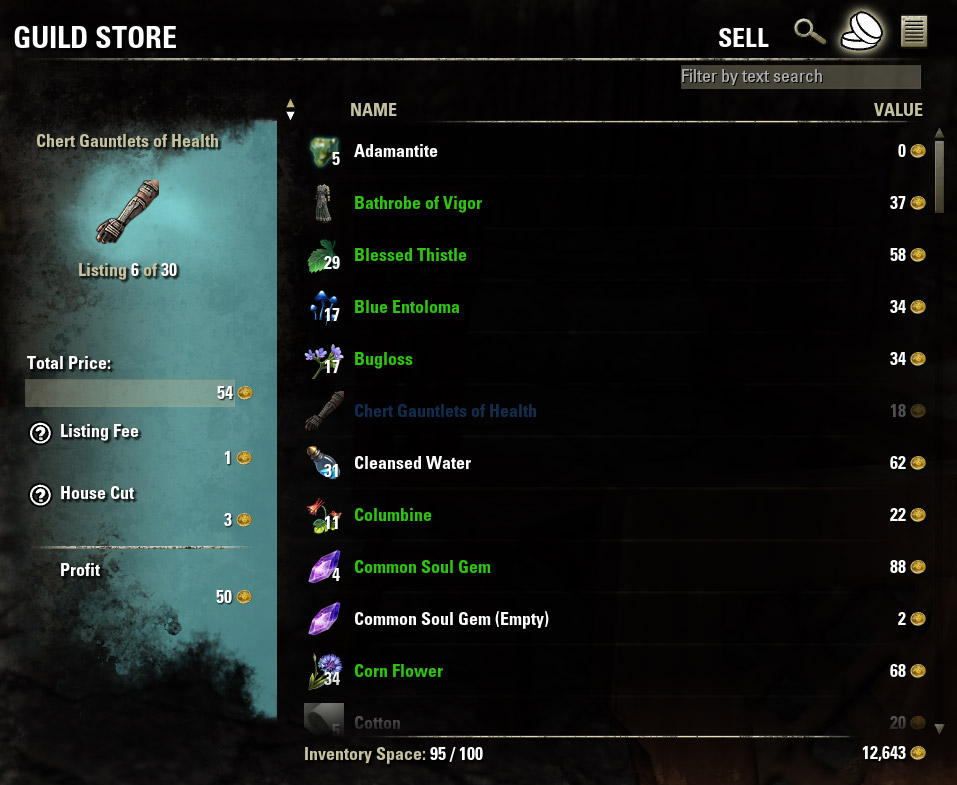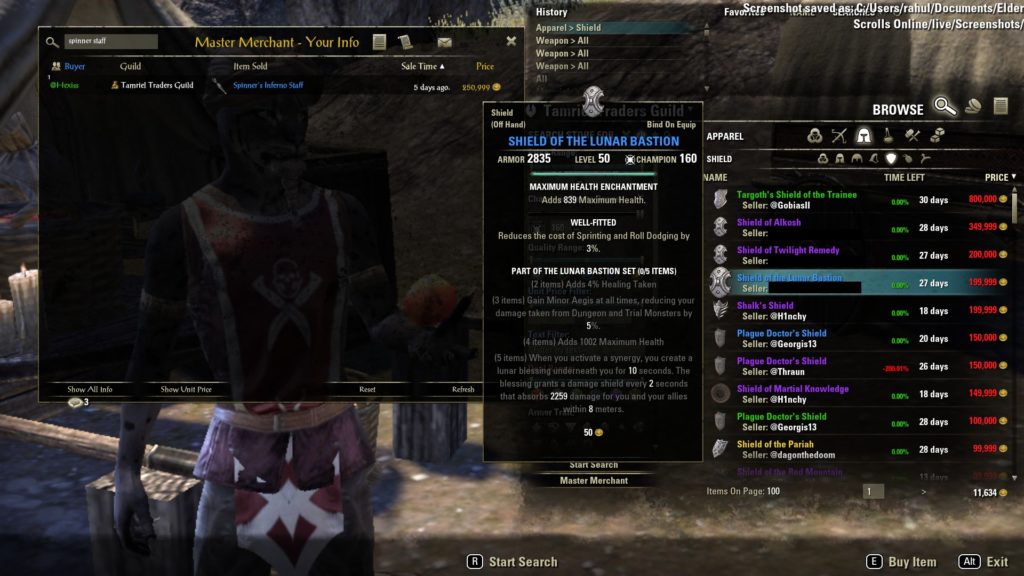Table of Contents
Introduction
The Elder Scrolls Online is a massively multiplayer online game, and as such, sustains a player-based economy. Many MMOs of similar size encourage completely free trade amongst players via an auction house, galactic trade network, or other lore-based interfaces. Usually, this means every player in a particular world, shard or server can view all the items listed in one interconnected marketplace.
Guild Stores

Instead of a single, server-wide auction house, ESO handles its economy through guilds. As with other MMOs, guilds are player founded organizations that come together for a common purpose. Some focus on PvP or PvE content, while others focus on economic opportunities.
Every guild, once the 50 member threshold is achieved, gets access to a Guild Store. Guild members with permissions can buy and sell to each other, via the Guild Store selection at any reputable Banker.
Selling items in a guild store comes with costs3. Upon posting an item for sale, the store charges the seller a 1% deposit, returned upon a successful sale. Once sold, there is a 3.5% tax paid to the guild’s coffers, and an additional 3.5% is lost as a gold sink mechanic. An offering to the forces of Oblivion, I suppose.
The guild tax is small, so many guilds will supplement income with donations, fundraising events like raffles, or even charge a weekly fee for access to the store. Guilds can be joined through chat or the Guild Finder tool. The Guild Finder can search through all guilds on your server by preferred activity, though there is a lot of overlap. Players may be members of up to five different guilds, regardless of Alliance. Guildmates in other Alliances are still fair game in PvP, though!
It should go without saying that, as with any online interaction, your mileage may vary. Most guilds you come across are generally friendly and eager to teach new players. Regardless of your preferred gameplay style and motivations, guildmates want you to be successful in making the guild more successful, and finding a mentor can be a snap.
Of course, ESO is an MMO, and no MMO exists without griefers, trolls, and various Internet ne’er-do-wells. PvP griefing is limited to Cyrodiil, fortunately, but there are plenty of known guild spies and bank robbers out there. Trader bidding can get competitive, and the big guilds want to control the best Traders. Spying is more common than you’d think, so make sure to heed any blacklists maintained by your guild.
Guild Traders

Additionally, instead of being separated by the server (EU, NA, PS4, XBone), each zone is also treated separately. Every area in ESO, from Auridon to Wrothgar, has several Guild Traders located in cities and, occasionally, at important crossroads or villages.
Guilds can bid for access to a Guild Trader to allow non-guild players to buy from their store. This is a challenge due to the limited number of Traders available and hundreds of guilds competing for them. Guilds bid weekly for their preferred Traders, and the most popular can cost more than 10 million gold to win them!
The most popular Traders can vary from platform to platform and server to server and can change as different zones traffic fluctuates based on events, changes to endgame meta, and time of day.
All told, there are 197 Guild Traders across Tamriel, not counting Cyrodiil. Cyrodiil, the frontline of ESO’s three-way PvP campaigns, does not offer any Guild Traders, as we know them elsewhere. In Cyrodiil, Keeps are strong strategic points that change hands constantly between Alliances. Each Keep, once captured, offers a siege weapon trader, the Keep Quartermaster who also allows access to the store of the guild controlling the keep.2
With so many guilds and so many Traders available, pricing can be tricky. Console players are often limited to merely asking around at each Trader in a zone to find the best deals and then pricing your goods accordingly. Most commonly purchased items, such as crafting materials, will tend to maintain stable prices in every zone. Big sellers such as Best-in-Slot (BiS) gear items can fluctuate wildly across zones.
Addons and Mods

PC players have a distinct advantage over console players in the form of mods. Nexusmods.com, esoui.com, and Minion.mmoui.com offer easy to use and extensively tested mods granting players powerful tools in managing their economic needs. While these add-ons are not considered cheating, per se, they do allow for powerful customization and less frenetic trading experience.
The most powerful, in my humble opinion, is MasterMerchant (MM) by Philgo684 allows the player to track all activity across all available guild stores and adds filters and functionality to the guild store interface to make searching, comparing, and undercutting easier.
Another powerful tool is Tamriel Trade Center (TTC) by Steven Chen5. This client-based addon scans and tracks sales activities across every Trader you talk to, even if they are not your guild! TTC also uploads this information to their database and keeps you updated in-game to price trends across Tamriel.
Tips on Making Gold
Getting into more lucrative guilds that consistently get the top traders can be a process and usually involves some investment capital to pay steep weekly fees or mandatory “donations” for access to the store. Be wary of these guilds and on the lookout for embezzlers.
The mid-tier guilds are often the best place to start. Fees are smaller, if not nonexistent, and leadership will usually bid on realistic Traders that, may not be the best, still get some decent traffic during peak hours.
Never post a sale of less than 99 gold — stack items to get the price up or sell in zone chat instead. Help keep your store uncluttered with junk, help the guild earn, and you will also manage your store slots more efficiently.
Do the legwork and research your pricing to stay competitive while not undercutting your guildmates. People notice that kind of thing and complain. If you are a new member of a 400 member guild, doing that once can get you kicked.
If that 7% skimmed off the top of your sales is a deal-breaker, go Independent. As with any freelancer, marketing and point of sale are all on you, but you can avoid taxes that can add up when you are selling a stack of Dreugh Wax for 800,000 gold. Point of sale is handled through direct trading or cash on delivery (COD) mail. However, COD mail charges a postage fee depending upon the value of the item, paid by the buyer.
Raw crafting materials are more valuable than refined. The refining process grants inspiration to level crafting skills, so don’t underestimate the value of farming nodes while on your adventures.
Sources
1 Unofficial Elder Scrolls Wiki. https://en.uesp.net/wiki/Online:Guild_Traders
2 Guild Traders: What and How. http://aktamrieltrade.com/index.php?option=com_kunena&view=topic&Itemid=538&catid=2&id=44
3 Guilds. https://en.uesp.net/wiki/Online:Guilds
4 MasterMerchant. https://www.nexusmods.com/elderscrollsonline/mods/64
5 Tamriel Trade Centre. https://us.tamrieltradecentre.com/pc/Trade

